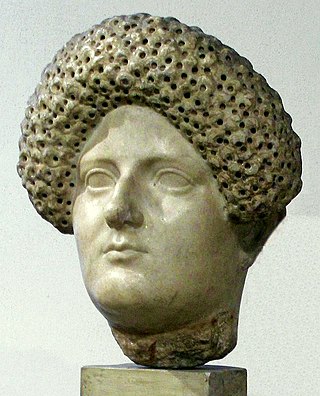
In Greco-Roman mythology, Aeneas was a Trojan hero, the son of the Trojan prince Anchises and the Greek goddess Aphrodite. His father was a first cousin of King Priam of Troy, making Aeneas a second cousin to Priam's children. He is a minor character in Greek mythology and is mentioned in Homer's Iliad. Aeneas receives full treatment in Roman mythology, most extensively in Virgil's Aeneid, where he is cast as an ancestor of Romulus and Remus. He became the first true hero of Rome. Snorri Sturluson identifies him with the Norse god Víðarr of the Æsir.

Domitia Longina was a Roman empress and wife to the Roman emperor Domitian. She was the youngest daughter of the general and consul Gnaeus Domitius Corbulo. Domitia divorced her first husband, Lucius Aelius Lamia Plautius Aelianus in order to marry Domitian in AD 71. The marriage produced only one son, whose early death is believed to have been the cause of a temporary rift between Domitia and her husband in 83. She became the empress upon Domitian's accession in 81, and remained so until his assassination in 96. She is believed to have died sometime between AD 126 and 130.

The insects of the beetle family Chrysomelidae are commonly known as leaf beetles, and include over 37,000 species in more than 2,500 genera, making up one of the largest and most commonly encountered of all beetle families. Numerous subfamilies are recognized, but the precise taxonomy and systematics are likely to change with ongoing research.

The longhorn beetles (Cerambycidae), also known as long-horned or longicorns, are a large family of beetles, with over 35,000 species described.

The green imperial pigeon is a large forest pigeon. The large range extends from Nepal, southern India and Sri Lanka eastwards to southern China, Indonesia and the Philippines.

The downy emerald is a species of dragonfly. It is metallic green and bronze in color, and its thorax is coated with fine hairs, hence its name. Like most other emeralds, the downy emerald has bright shiny green eyes. Adults are around 5 cm in length, and are in flight from May through July each year.
Frederic John Sidney Parry was an English entomologist who specialised in Coleoptera, principally Lucanidae.
Piezocera is a genus of beetles in the family Cerambycidae, containing the following species:
Piezocera aenea is a species of beetle in the family Cerambycidae. It was described by Bates in 1867.
Domitia is a genus of Long-Horned Beetles in the beetle family Cerambycidae. There are about seven described species in Domitia, found in Sub-Saharan Africa.
Lagrida aenea is a species of beetle in the family Cerambycidae. It was described by Hintz in 1919. It is known from Gabon, Cameroon, Equatorial Guinea, the Democratic Republic of the Congo, and Uganda. It feeds on plants such as Triplochiton scleroxylon, Petersianthus macrocarpus, Anonidium mannii, and Anthonotha macrophylla.
Lepturonota tristis is a species of beetle in the family Cerambycidae. It was described by Xavier Montrouzier in 1861, originally under the genus Leptonota.
Domitia cervina is a species of flat-faced longhorns in the beetle family Cerambycidae. It is found in Angola, DR Congo, Gabon, Central African Republic, and Republic of the Congo.
Domitia lupanaria is a species of flat-faced longhorns in the beetle family Cerambycidae. It is found in Gabon.
Domitia marshalli is a species of flat-faced longhorns in the beetle family Cerambycidae. It is found in the Central African Republic, Republic of the Congo, Cameroon, and DR Congo.
Domitia viridipennis is a species of flat-faced longhorns in the beetle family Cerambycidae. It is found in Cameroon and Nigeria.
Planodema scorta is a species of beetle in the family Cerambycidae. It was described by James Thomson in 1858, originally under the genus Domitia.
Ortalis is an historic genus of Ulidiid or picture-winged flies, first described by Fallén in 1810. It served as the type genus for the family Ulidiidae, which was called Ortalidae at the time. In 1932, it was pointed out by Adlrich that the name Ortalis was preoccupied by a genus of birds which had been named by Merrem in 1786. The name of the fly family was therefore revised, with some authors calling it Otitidae until Ulidiidae was settled on as standard. The genus itself was found to be paraphyletic, and all of its species have been reassigned to other genera, some in the Ulidiidae, and some in other Tephritoid families. In the following list, the species are organized according to the families and genera to which they have been reassigned.
Domitia basilewskyi is a species of flat-faced longhorns in the beetle family Cerambycidae. It is found in Rwanda.
Domitia bomansi is a species of flat-faced longhorns in the beetle family Cerambycidae. It is found in DR Congo.





